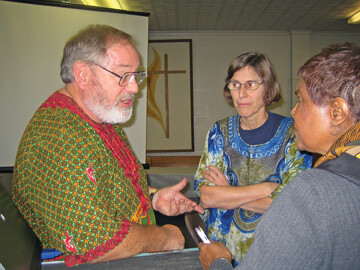
Missionaries to Congo committed to education
BY LINDA WORTHINGTON
UMCONNECTION STAFF
For 15 years a war has raged in Eastern Congo on the border with Rwanda, making refugees of hundreds of thousands of its citizens, causing widespread hunger and poverty.
But that's Eastern Congo, and conference missionaries Jeff and Ellen Hoover live as far as you can get from there in the far southern section of the Democratic Republic of the Congo on the Zambia border, in a country the size of the United States east of the Mississippi, where it takes four or five hours to drive 100 miles.
 The Hoovers recently returned to Lumbubashi after spending a month visiting their 14 supporting churches and others in the Baltimore-Washington Conference.
The Hoovers recently returned to Lumbubashi after spending a month visiting their 14 supporting churches and others in the Baltimore-Washington Conference.
They also squeezed in a few days at Drew University, researching the United Methodist archives, preparing for ways to tell the story of the Methodist Church in their adopted country. It will celebrate its 100th anniversary in 2010, and the 50th year of its independence. It is 125 years since the first missionaries arrived.
The Hoovers went first to the Congo in 1977, expecting to stay three years and return to the United States for more mundane church or educational work. "Each time we found a good reason to come back," Ellen Hoover said.
In 1979, the General Board of Global Ministries appointed them as missionaries to the Congo, formerly called Zaire. They began their long association in higher education, sometimes at the government university in Lumbubashi, where they live, sometimes at Katanga Methodist University in Mulungwishi in Katanga Province, 100 miles north. After 29 years and raising three children, the country is home.
Jeff Hoover is deeply committed to the Methodist University of Katanga (UMK), and spends much of his time there.
In 1940, then District Superintendent John Springer established the Mulungwishi mission station to be the educational center for the region. Today, students coming from cities and rural areas of the Congo choose one of three schools in which to study: theology, education or information technology (computer science). All education is taught in French and both of the Hoovers are bilingual.
Jeff Hoover is a professor of church history and in the School of Information Technology, as well as chief librarian, a big challenge with antiquated or no systems, sporadic electricity and few resources. "Books are shelved by color and size," he said.
Ellen Hoover teaches there part-time, courses in Islam and church history in the School of Theology. Both Hoovers have doctoral degrees in African history.
"This year we're graduating the first students of a master's degree in leadership," he said.
The School of Theology has a strong faculty, with five or six Congolese with doctorates in theology from abroad, and visiting professors. Classes are usually eight to 10 students. They all have computers, but electricity is not always reliable. It's bought from the nearby railroad, which has first dibs on its use. The staff gets $20 a month, government salary.
"We find many students at the university aren't able to pick out their country on a map," Ellen Hoover said. "They probably never saw one before."
Her main activity is with the English-speaking School of Lumbumbashi (TESOL), an elementary and middle school for children of missionaries, full-time church workers and other English-speaking families. She helped start the school in 1987, when there were no schools in English. Today TESOL has 60 students and is growing.
At the University of Lubumbashi, a campus with about 25,000 students, Jeff Hoover teaches pre-colonial African history. Much of his passion is for the development of Congolese staff to teach future generations. "We're training 100 PhDs to be faculty for the next generation," he said.
Ellen Hoover is expecting an influx of students to TESOL because of the huge growth in the mining industry in the area.
As more people arrive to work in the administration of the mining industry, the parents seek educational facilities for their children. TESOL is such a school, and the children, no matter what nationality or religious preference, are Ellen Hoover's mission.

Login/Register to leave comment